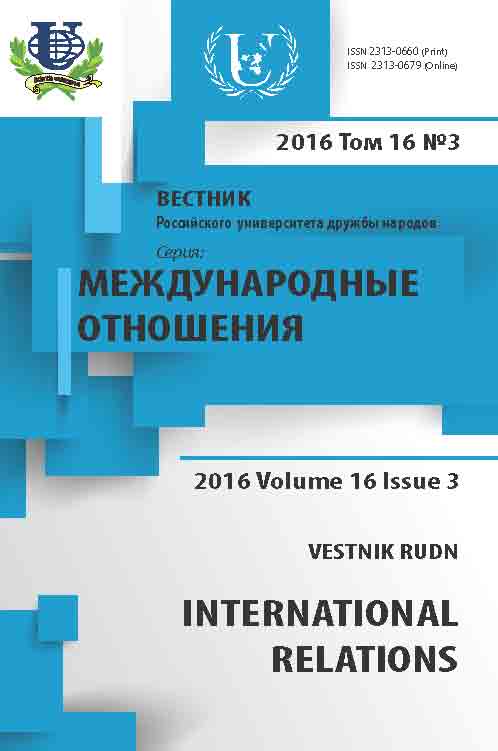Western Balkans in the Light of Regional Security Complex Theory
- Authors: Pejic J.1
-
Affiliations:
- RUDN University
- Issue: Vol 16, No 3 (2016): International Conflicts: Quo Vadis?
- Pages: 494-504
- Section: ARTICLES
- URL: https://journals.rudn.ru/international-relations/article/view/14767
- ID: 14767
Cite item
Full Text
Abstract
This article analyzes an acute international security issues of Western Balkans sub-complex using Regional Security Complex Theory (hereinafter RSCT) as an advanced theoretical approach. The study allows not only to identify the key elements and main features of RSCT, but also to form an idea of the Western Balkans as an extremely heterogeneous and conflict region. With the aim to confirm RSCT on the example of Western Balkans sub-complex, the author raised number of tasks, among which are: application of four levels of RSCT in order to analize such Western Balkans security dynamics as relations between the countries in the region, relations of the region with neighboring regions and the role of global powers in the region; another task of the paper is analysis of Western Balkans as a sub-complex within the European Regional security complex. This issue is one of the reasons why Balkan itself deserves special attention of RSCT, as during the 90s there was a possibility for it to form a special RSC, due to all specifics that were taking place at that time. As a result of research, the author gives three possible scenarios for Western Balkans sub-complex to become part of European Regional Complex in the future. The main conclusions of the article stress that Western Balkans retain their specificity, which requires a separate study and a special approach, and also confirm that RSCT is an effective methodological tool, which allows researchers to analyze regional international political processes in the field of Western Balkans security.
Keywords
About the authors
Jndiana Pejic
RUDN University
Author for correspondence.
Email: 1042145085@pfur.ru
Moscow, Russia
References
- Buzan, B., Waever, O. (2003). Regions and powers: The structure of international security, Cambridge: Cambridge University Press.
- Buzan, B. (1983). People, states, and fear: The national security problem in international relations. Brighton: Wheatsheaf Books.
- Buzan, B., Waever, O., de Wilde, J. (1998). Security: a new framework for analysis. Boulder: Lynne Rienner Publishers, Inc.
- Busygina, I.M. (2001). Kontseptual'nyye osnovy yevropeyskogo regionalizma [Conceptual bases of European regionalism]. Regiony i regionalizm v stranakh Zapada i Rossii. Moscow.
- Cvijic, J. (1991). Balkan peninsula. 2nd. edition, Vol. 2, Belgrade: SANU; NIRO Literary Gazette, pp. 14-15.
- Halilovich, E. (2012). Postsovjetski geopoliticki prostor i Balkan. Sarajevo: Dobra Knjiga.
- Kronja, J., Lopandich, D. (2012). Regionalna saradnja u Jugoistočnoj Evropi i evropske integracije – u potrazi za neophodnom komplementarnošću, Evropski pokret Srbija, Friedrich Ebert Stiftung Fondacija, regionalna stručna rasprava.
- Lukin, A.L. (2011). Teoriya kompleksov regional'noy bezopasnosti i Vostochnaya Aziya, [The theory of regional security complexes and East Asia] Regionovedcheskiye issledovaniya, Oykumena-nauchno-teoreticheskiy zhurnal, 2 (17).
- Mikhaylenko, Ye. B. (2014). ,,Stariy” i ,,noviy” regionalism: teoreticheskiy diskurs [,,Old’’ and ,,new” regionalism”: Theoretical discourse]. Yekaterinburg: Izdatel'stvo Ural'skogo universiteta.
- Mouritzen, H. (1997). The Future of International Relations. London: Routledge.
- Nikolic., G. (2010). Da li je etnicka i kulturolosko-religiozna razlicitost prepreka ekonomskom razvoju? Međunarodni problemi, 62(2), pp. 329–347.
- Pop, A. (2011). The Independent Statehood Between the Domino and the Boomerang Principles: The Case of Kosovo. International Conference about Balkan and North Cyprus Relations: Perspectives in Political, Economic and Strategic Issues, Center for Strategic Studies, Eastern Mediterranean University, Famagusta, 81.
- Pop, A. (2013). The Independence of Kosovo in the Light of Regional Security Complex Theory. European Journal of Science and Theology, 113.
- Sokolova, P.S. (2007). Balkanskiy region i yevropeyskaya bezopasnost':. aktual'nyye problemy i puti ikh resheniya [The Balkan region and European security: current problems and their solutions], Moscow.
- Tiri, E., Donila, P. (2009). The European Perspective of Western Balkans, Albania West University of Timişoara.
- Todorova, M. (2006). Imaginarni Balkan. Beograd.
- Tripkovich, M., Pusic, L., Shlhyukich, S. (2007). Raskrsca Srbije. Novi Sad, Odsek za Sociologiju.
- van Willigen, N. (2013). East European Politics, The geopolitical battle for Serbia, Newsmagazine Federal Assembly-Parliament Russian Federation, The Russian Federation today, 9, pp. 429-450.
- Volc, K. (2008). Teorija međunarodne politike, Centar za civilno – vojne odnose, Beograd.
- Volkova, Y.G. (2002). Regional'nyye issledovaniya. [Regional studies]. Rostov n/D: Phoenix.
- Vucic, S., Milenkovic, M. (2014). Makedonija: Faktor stabilnosti ili nestabilnosti u regionalnom podkompleksu Zapadni Balkan? pp. 423-442. DOI: 10.2298 / MEDJP1404423V.
- Zambeli, N. (2010). Between the Balkans and the West: A problem of Croatian Identity in the Post Tudjman Period and Discursive Reconstruction of the Region. Politicka Misao, 1, pp. 55-76.
- Zhuravlev, V.E. (2015). Ispol’zovaniye metodologiji teorii komplksov regional’noy bezopasnosti v distipline ,,Geopolitika” [Use of Regional Security Complex Theory methodology in the Discipline of ,,Geopolitics”]. REU Universitet imenni G.V. Plehanova, Inetput konferenciya, Moscow.
Supplementary files










